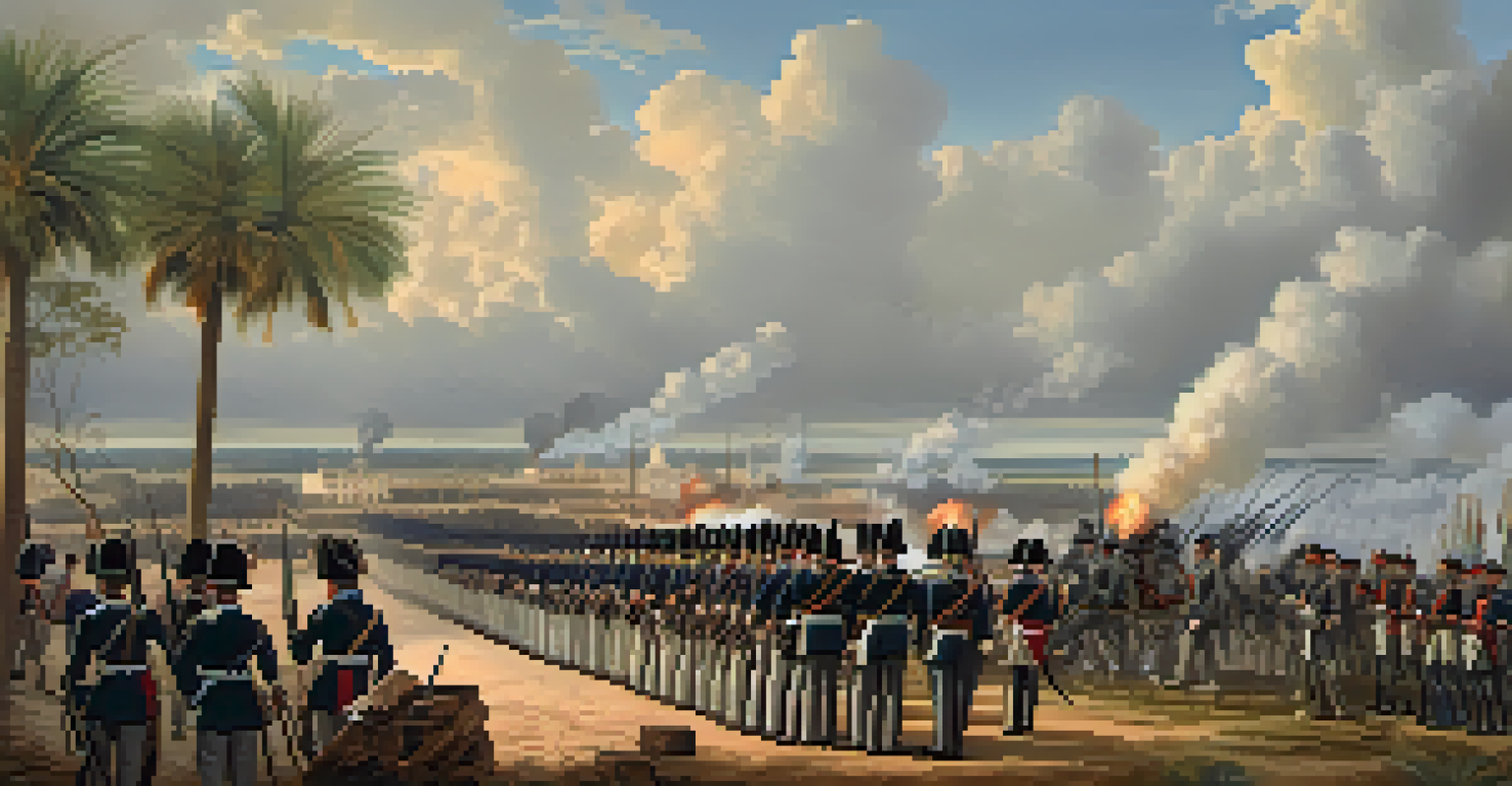Georgia's Role in the American Revolution and Independence

Georgia: The Southern Frontier in the Revolution
Georgia, established as a colony in 1732, played a unique role in the American Revolution. As the southernmost colony, it was strategically important because of its location and resources. The colony's population included a mix of loyalists and patriots, creating a complex social dynamic that would influence the Revolutionary War efforts.
Freedom is never given; it is won.
As the conflict escalated, Georgia found itself at the forefront of military actions and political intrigue. The British saw Georgia as a critical base for their operations in the South, which made the stakes even higher for the colonists. The presence of British troops in Savannah, the colony's capital, posed a direct challenge to the revolutionary spirit among Georgians.
By understanding Georgia's position as a frontier colony, we can appreciate how its unique challenges and opportunities shaped its contributions to the revolution. This backdrop set the stage for the significant events that would unfold as the colonists rallied for independence.
Key Figures in Georgia's Revolutionary Movement
Several influential figures emerged from Georgia during the Revolutionary War, driving the push for independence. One notable leader was Button Gwinnett, who became a signatory of the Declaration of Independence. His commitment to the cause exemplified the spirit of many Georgians who sought to break free from British rule.

Another important figure was Lachlan McIntosh, a Scottish immigrant who played a significant role in military campaigns. His leadership in battles like the Siege of Savannah showcased the bravery and determination of Georgian patriots. These leaders worked tirelessly to rally support and organize resistance against British forces.
Georgia's Strategic Importance
As the southernmost colony, Georgia's unique location and resources made it a critical player in the Revolutionary War.
Through the efforts of such individuals, Georgia's revolutionary movement gained momentum. Their stories remind us that the fight for independence was not just a northern endeavor; it was a collective struggle that included voices from every corner of the colonies.
The Siege of Savannah: A Turning Point
The Siege of Savannah in 1779 marked a pivotal moment in Georgia's role in the Revolutionary War. This military engagement saw American and French forces attempt to reclaim the city from British control. Despite their combined efforts, the siege ultimately ended in failure, highlighting the challenges faced by the revolutionary forces.
The price of freedom is eternal vigilance.
The outcome of the siege had significant implications for Georgia and the southern campaign. It underscored the need for better coordination among the colonies and their allies, as well as the importance of intelligence-gathering. The lessons learned from this engagement would inform future military strategies.
Even though the Siege of Savannah was a setback, it galvanized the spirit of resistance among Georgians. The determination to reclaim their territory from British rule would lead to further efforts in the years that followed, emphasizing the colony's resilience in the face of adversity.
Georgia's Role in the Declaration of Independence
Georgia's contribution to the Declaration of Independence is often overshadowed by other colonies. However, the colony's signatories played a crucial part in articulating the desire for freedom. Their signatures represented a commitment to the revolutionary cause and the principles of liberty and self-governance.
The decision to join the Declaration was not without controversy, as many Georgians still held loyalist sentiments. This internal conflict illustrated the complexity of the revolutionary landscape in the colony. Nonetheless, the act of signing united various factions in the common goal of independence.
Key Revolutionary Figures
Leaders like Button Gwinnett and Lachlan McIntosh exemplified Georgia's commitment to independence through their military and political efforts.
By participating in the Declaration, Georgia affirmed its place among the colonies fighting for freedom. This action laid the groundwork for future governance and the establishment of a new nation, demonstrating that every colony's voice mattered in the journey toward independence.
The Establishment of a New Government in Georgia
Following the war, Georgia faced the challenge of establishing a new government. The Articles of Confederation provided a framework, but it soon became clear that a stronger central authority was needed. This led to the drafting of Georgia's state constitution in 1777, which aimed to reflect the principles of democracy and representation.
The new government faced numerous hurdles, including economic instability and the need to address the grievances of loyalists and patriots alike. Balancing these interests was critical for fostering unity in a post-war society. Leaders like Archibald Bulloch played pivotal roles in navigating these complex challenges.
Ultimately, the establishment of a new government in Georgia marked a significant step toward self-determination. It laid the foundation for the state's future governance and demonstrated the resilience of its citizens in the aftermath of the Revolutionary War.
Post-War Challenges and Georgia's Recovery
In the aftermath of the American Revolution, Georgia faced significant challenges as it sought to rebuild. The war had left its mark on the colony's economy, infrastructure, and social fabric. Many towns were devastated, and the population was divided between loyalists and patriots, complicating the recovery efforts.
To address these issues, state leaders focused on restoring order and revitalizing the economy. Initiatives to promote agriculture and trade were launched, recognizing that a prosperous economy was essential for a stable society. The state's agricultural roots, especially in cotton and rice, played a crucial role in this recovery.
Enduring Legacy of Resistance
Georgia's contributions to the American Revolution highlight the collective struggle for freedom and the resilience of its citizens.
Despite the difficulties, Georgians demonstrated resilience and determination. Their ability to come together and rebuild was a testament to their commitment to the ideals of independence and self-governance, setting the stage for the state's future growth.
Georgia's Lasting Legacy in American Independence
Georgia's role in the American Revolution has left a lasting legacy that continues to resonate today. The colony's experiences and contributions played a vital part in shaping the fight for independence. From military engagements to political leadership, Georgians were integral to the broader revolutionary narrative.
The ideals of liberty and self-determination championed by Georgian leaders have influenced generations. They serve as a reminder that the struggle for freedom was a collective effort that included voices from all corners of the colonies. This legacy is honored in various historical sites and commemorative events across the state.

As we reflect on Georgia's contributions to American independence, we recognize the importance of every individual's efforts in the fight for freedom. The state stands as a testament to the power of perseverance and the enduring spirit of those who dared to challenge the status quo.